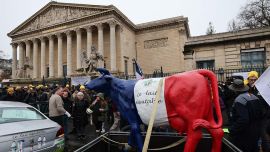Javier Milei seems to be having fun. As the first anarcho-capitalist president in history, the wild-haired economist has become an international celebrity, visited Israel to proclaim his admiration for the Jewish faith, dropping in on Switzerland to prophesied about the dangers of “socialism” before the Davos crowd, and stopped in the United States to hug Donald Trump at a major conservative conference.
But while Milei emerges as the newest “golden boy” of the Global Right, he has also managed to receive a blessing from Pope Francis during a visit to the Vatican, who unexpectedly appeared joyful despite a history of insults and ideological discrepancies emanating from the ultra-libertarian. The pontiff always seems to be playing one or two steps ahead of the rest – maybe it’s the benefits of incarnating the Holy See.
Milei has even demonstrated that he likes playing dress up, loyal to the cosplay tradition of several of his followers (and deputies), such as when he wore a special orange jacket during his visit to the Marambio and Esperanza bases in Antarctica, and donned Army fatigues in his quick trip to Bahía Blanca after an intense weather event. At the Casa Rosada, he’s often seen in a biker jacket and boots, which goes hand-in-hand with the chilling temperatures the air conditioner is set to leading his private meeting room to be dubbed “the freezer.” It’s been said that, privy to his aesthetic, the jacket helps keep him looking slimmer.
The president also enjoys wearing a suit and tie, the sort of unofficial outfit he kept on during his days as travelling polemist on late-night TV panels. It has since been adopted by several of his fellow libertarians, like Ramiro Marra, who are increasingly distant from Milei’s inner circle apparently because of sister Karina’s decision. It is while wearing his suit — he is said to favour the Rochas brand — that Milei has had some of his most high-voltage clashes with the rest of the political ecosystem that he despises. He faced the “caste” during his inauguration, when he decided to give his opening speech on the esplanade of Congress, facing “the people” instead and showing his back to the group that he’s picked as his main adversary. Milei is truly inspired by the United States and its protocol, not only taking a page from their inauguration and state-of-the-union addresses, but also in the branding and logos of his administration. “The bad artists imitate, the great artists steal,” reads the quote apocryphally attributed to Pablo Picasso, immortalised in a rock slab.
In typical “gringo” fashion, the Argentine president set a pulpit in front of the desk where lower house Chamber of Deputies Speaker Martín Menem and Vice-president and Senate chief Victoria Villaruel sat for his version of the state-of-the-union address. Also in line with US tradition, and breaking with Argentine norms, he gave the speech at 9pm, seeking prime-time ratings. As he spoke, the official TV transmission focused on the government and key figures from La Libertad Avanza, and occasional allies. Governors and members of the opposition were omitted. Applause frequently interrupted the president, as he spoke about the current situation, what he’s done, and plans for the future. While on TV, the applause sounded deafening, but it was coming from one sector of the audience. The Peronist opposition had mulled turning its back to the president, or not even showing up at all. Interestingly, while Menem clapped constantly, Villaruel barely put her hands together.
The most important part of his address was the offer of a “May Pact,” through which everyone would be welcome to agree on 10 fundamental concepts for the future of the nation in exchange for the approval of his ambitious reform package laid out in the late “omnibus bill.” His bargaining chip: re-establishing income tax brackets that would give provincial governors much needed budget breathing room in a critical economic context. Milei’s economy minister, Luis ‘Toto’ Caputo, achieved an unsustainable budget surplus by diluting or “blending” (from the Spanish word, “licuar”) pension and retirements payments, but also by cutting discretionary budget transfers to the provinces, among other things. Milei had called the governors “traitors” in the heat of the “omnibus” bill debacle, having previously indicated he would “bankrupt them” if they don’t approve his bills. According to Página/12 reporter Leandro Renou, he told directors of the YPF national energy company and the state-run Banco Nación that he would “piss on them” first, and “if they keep on messing [with the bill], I’ll shut down Congress.”
The initial market reaction to Milei’s speech before Congress was positive, with financial assets rallying given the prospect of a political accord that would help cement the structural reforms to guarantee a budget balance. The value of black market ‘blue’ peso-dollar exchange rate has not only been contained, but has decreased as the peso has strengthened, breaking below 1,000 pesos this past week, while Argentina’s country risk premium remains well below the 2,000 units mark. While there are many factors at play, one of the keys of the “early success” of the Milei-Caputo plan in keeping the peso-dollar rate under control and financial assets in rally mode has to do with confidence in their stalwart will to achieve a budget surplus this year. This requires a certain level of political consensus, as they’ve already managed the support of the International Monetary Fund. The market is giving Milei the iconoclast another chance.
The big question mark hanging over Milei during the latter stages of the presidential campaign was whether he had the political skill, attitude and predisposition to guarantee governability. His temper and apparent madness was a big issue, as was the inexperience and limited reach of his nascent political organisation. Through a blend of amateurism and strategy, the libertarian experiment has hit a wall with its reforms, utilising an unorthodox mega-bill and emergency decree, together with trench warfare against deputies and governors. It failed. Milei, the master of “synthetic power” (as previously explained in these columns) needs his plan to move from the whiteboard — and social media — to the realpolitik realm of Argentina’s traditional power structure, either from within or by trampling over it.
Fortunately, fears of social unrest appear to have receded, despite the devastating impact on people’s purchasing power. Rumours of a coup of sorts have also slid to the background, with Mauricio Macri and his PRO party struggling to get through to Milei as Villaruel sits on the sidelines. With a dishevelled Peronism that doesn’t know whether it still wants to be ruled by Cristina Fernández de Kirchner or not and a fractured Juntos por el Cambio, the libertarian leader finds himself in a favourable political situation, aided by his high-but-fading popularity. The “May Pact” appears as his biggest bet, but the main issue remains unaltered, governability.
In his speech, Milei said, “our pulse is firm and the path is clear, we will accept to pay all of the political costs to achieve these changes, even those that are not ours. If the price to pay to fix this nation is ostracism, you will find me there with pride. For us, there is nothing more sacred than the fight for freedom.”























Comments